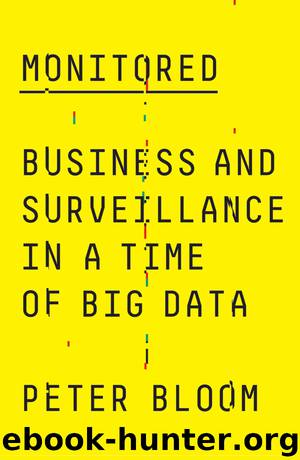Monitored by Bloom Peter;

Author:Bloom, Peter;
Language: eng
Format: epub
Publisher: Book Network Int'l Limited trading as NBN International (NBNi)
Deeper Data
It is commonly proclaimed that we have entered into the era of big data. It may be more accurate, though, to declare that we are in the period of ‘deeper data’. This concept is similar but not identical to machine-learning models of ‘deep learning’ that seeks to use learning data representations and artificial neural networks in order to enhance predictions and learning. Deeper data refers instead to the mining of our inner psychological and spiritual worlds – the turning of these profoundly personal aspects of ourselves into data resources to collect, commodify and exploit.
On the surface, big data is primarily concerned with observable behaviour and preferences. It tracks what you click on, what you buy, what you post, how you breathe, where you go and even how much you walk. From this large and wide-ranging set of data, it is able to digitally reconstruct you as a person. However, this cyber-identity will always be incomplete. On a subjective level, it reflects the feeling of alienation most exhibit towards their culturally produced social selves.34 Yet it also poses a challenge for data analysis to dig deeper into who ‘we really are’. It is what the sociologist Andrew Abbott referred to as ‘an extensive commodification of important parts of previously esoteric knowledge’.35
This discovery of our most secret and hidden information opens the digital floodgates to a much more invasive form of data mining. Everything about everyone, at least in theory, could now be discovered. It digitally locates data, ‘residing in the deeper emotional layers of the self, the spiritual self reveals itself through one’s feelings, intuitions, and experiences’.36 Achieving wholeness was increasingly and inexorably linked to compiling as much personal data about yourself as possible over the most wide-ranging areas. Even beyond the practices of hi-tech data collection, the culture of wellness progressively revolved around a strict monitoring of one’s experiences and responses. This ethos is exemplified in the spirit app SoulPulse, which allows people to track their ‘spiritual data’ – such as your daily spiritual practices and religious experiences – in real time. Quoting co-founder Jon Ortberg, a senior pastor at Menlo Park Presbyterian Church, ‘Your soul matters more than your body. So the ability to monitor your inner, deepest self, your emotional and spiritual well-being, with real-time, realistic information is very valuable.’37
There is a growing need for marrying our deepest selves to data. It represents a modern and smart means for engaging with those ineffable parts of who we are and aspire to be. It promises to unlock our cosmic potential. The hope, or for some the fear, is that ‘digital technology and neuroscience will combine to create a new understanding of the divine’.38 Self-tracking is a modern extension of a classic desire to ‘know thyself’, and an even older longing to transcend it. Thus it is only through big data that we can begin to unravel the mysteries of the cosmos and our soul. As the renowned technology theorist David Berry presciently observes, ‘Computational technology has become the
Download
This site does not store any files on its server. We only index and link to content provided by other sites. Please contact the content providers to delete copyright contents if any and email us, we'll remove relevant links or contents immediately.
Cecilia; Or, Memoirs of an Heiress — Volume 1 by Fanny Burney(32008)
Cecilia; Or, Memoirs of an Heiress — Volume 3 by Fanny Burney(31431)
Cecilia; Or, Memoirs of an Heiress — Volume 2 by Fanny Burney(31374)
The Great Music City by Andrea Baker(30623)
We're Going to Need More Wine by Gabrielle Union(18587)
All the Missing Girls by Megan Miranda(14532)
Pimp by Iceberg Slim(13698)
Bombshells: Glamour Girls of a Lifetime by Sullivan Steve(13657)
Fifty Shades Freed by E L James(12875)
Talking to Strangers by Malcolm Gladwell(12801)
Norse Mythology by Gaiman Neil(12758)
For the Love of Europe by Rick Steves(11316)
Crazy Rich Asians by Kevin Kwan(8848)
Mindhunter: Inside the FBI's Elite Serial Crime Unit by John E. Douglas & Mark Olshaker(8653)
The Lost Art of Listening by Michael P. Nichols(7108)
Enlightenment Now: The Case for Reason, Science, Humanism, and Progress by Steven Pinker(6847)
The Four Agreements by Don Miguel Ruiz(6273)
Bad Blood by John Carreyrou(6246)
Weapons of Math Destruction by Cathy O'Neil(5781)
